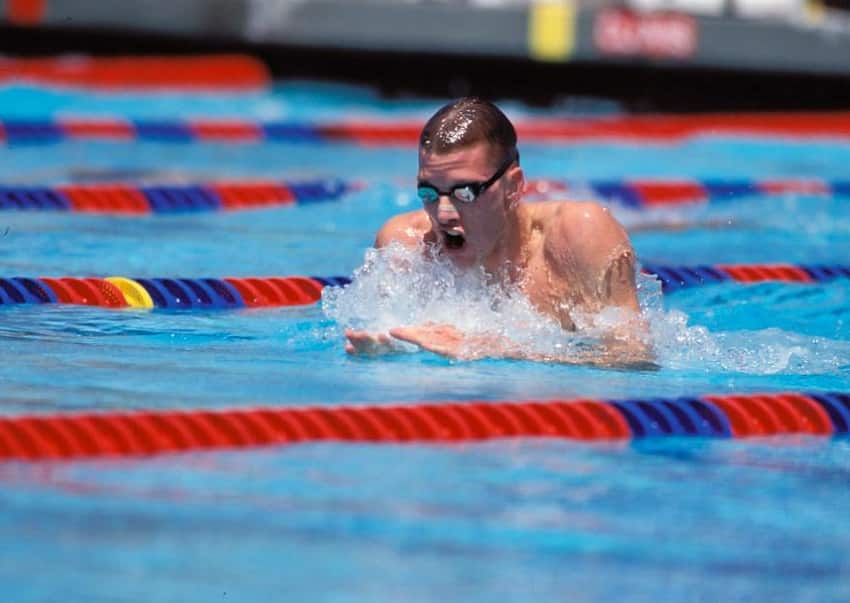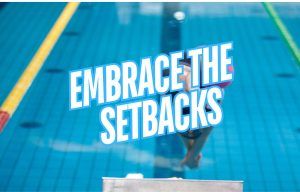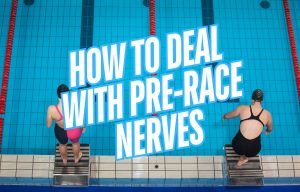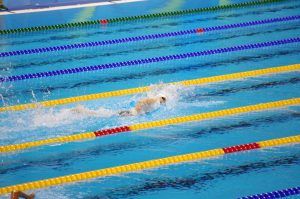
6 Benefits of Visualization for Swimmers
Wondering what visualization can do for your swimming? Here are some evidence-based benefits of visualization for swimmers for more confidence, less choking, and even better technique.

Tom Dolan is two years ahead of schedule.
The lanky 18-year old has been showing signs of greatness, and his coaches, including Jon Urbanchek at Michigan, expect big things for the IM and freestyle specialist in two years at the Atlanta Olympics.
But apparently Dolan doesn’t feel like waiting.
The year is 1994, the pool is the Foro Italico in Rome, and the meet is the FINA World Championships.
Dolan is laying waste to the world’s best swimmers in the 400m individual medley. After a prelims swim that didn’t feel too great, Dolan is charging for the finish. When he hits the touch pad it is a new world record, formerly belonging to one of the greatest swimmers of all time, Hungary’s Tamás Darnyi.
“My aim with Tom was to get him ready for 1996,” says coach Urbanchek. “The Atlanta Olympics were my goal, and I thought he could be the number one IMer by then. He beat me by almost two years. I thought the road would be longer, but it took a lot less time.”
By the time they get to the Atlanta Olympics, Dolan is one of the top swimmers on the planet, having scorched the NCAA record books. In Atlanta, the “string bean”—he is six foot six and weighs 180 pounds with just 3% body fat—delivers a gold medal in the 400m individual medley.
Four years later, at the Sydney Olympics, Dolan delivers a 400IM that flirts with perfection. He surges out to a no-one-else-is-in-the-picture lead during the backstroke and never looks back, repeating as Olympic champion and smashing his own world record.
He is asked if he’d finally achieved his goal of the “perfect race.”
“It was pretty close,” Dolan says, smiling.
Dolan’s career on the world stage was legendary. Clutch swims and big celebrations.
What made it all the more remarkable was that behind the goatee, earrings and Olympic titles was someone who simply struggled to breathe most days at the pool.
Tom Dolan had a lot of natural talent. He benefited from the low-drag profile of his body, which was built like an eel. He had the long wingspan, big hands, and size fourteen feet that sailed him efficiently through the water.
He had the relentless work ethic and a competitive fire forged from countless yards and meters.
But Dolan also had something else.
A partially blocked trachea—windpipe—giving him access to only about 20 percent of the air an average person can gulp down. Like breathing through a straw.
Making matters worse, Dolan also suffers from exercise-induced asthma. Limited by the type of medications because most of them are on the banned substances list, he carries around an inhaler and uses Breathe-right nasal strips to keep air flowing.
Oh, and he also trains and competes in chlorinated pools, and well, we all know how the air can be in there from time to time.
Combined, it made the simple act of breathing a very real concern when Dolan was at swim practice.
“It can really get bad in our workouts,” said Dolan. “There will be a real tightness in my chest, and I won’t be able to get a lot of air.”
Over the span of six months he is sent to the hospital twice after hyperventilating and collapsing at the pool.
(Doctors cleared him to swim after a full round of tests. Also, his father and coach were often reminding Dolan to watch out for certain signs and sensations to protect himself in the water. “Hey, it’s great to have the fire and desire, but I also want him to have a little common sense,” said his father, Bill [1].)
But despite the perceived limitations, Dolan views the asthma, the smaller windpipe, the suffering and the agony as tools sharpening him into a better and more prepared swimmer.
By the time Dolan gets behind the blocks he knows the competition can’t possibly make him hurt any more than training and trying to breathe has.
“I know I’ve gone through more than anyone else in the world has to get there. I’d rather not have asthma, but it has made me tougher, made me stronger,” said Dolan [2]. “My coach says it actually helps me in meets because it increases my ability to withstand stress.”
“He has an incredible tolerance for pain,” says Urbanchek. “So he does suffer, but there is a good side.”
We tend to look at disadvantages or adversity as weaknesses. Because we don’t have the best facilities, the best coaches, or the most talent we settle for giving less than our best. We never go all in on our goals because we feel like we are starting from a position of inferiority/disadvantage.
We aren’t tall enough. Started too late in the sport. Not talented enough. The coach doesn’t give me enough attention. I’m the slowest swimmer in the group. It’s not fair.
It’s not hard for each of us to find a reason to not be successful. We all have one. Some, like Dolan, have a couple. When we start searching for reasons we can’t be successful we drain attention and resources on maximizing the things we do have.
Dolan took his “weaknesses” and flipped them on their head. By virtue of his perspective they turned into things that would boost his confidence and sense of preparation.
He also refused to waste energy and effort on trying to change things that can’t be changed. “Stressing over [the asthma] won’t make it better. So I just have to deal with it,” said Dolan [3].
Adversity is a weapon. It can fuel you. Motivate you. Be the chip on your shoulder every day in practice when you are putting in the laps.
A harder path gives you the confidence to know that whatever is thrown at you, you can handle it. A more difficult journey steels you for high-pressure moments.
Don’t fear adversity. It can be just the thing that gives you the confidence to take on the world.
Turn Your Setbacks into Comebacks. Stumbles, setbacks and failures are a natural part of the upwards trajectory of our swimming. What will your reaction be when the inevitable setback happens to you in the pool?
How Swimmers Can Develop World-Class Resilience. Grit, mental toughness, fortitude—whatever we’re calling it this week, is essential to your swimming success. Here’s why resilience is the difference maker you’ve been looking for in the pool.
Pic credit: Marco Chiesa

Olivier Poirier-Leroy Olivier Poirier-Leroy is the founder of YourSwimLog.com. He is an author, former national level swimmer, two-time Olympic Trials qualifier, and swim coach.
✅ Free shipping on Orders over $49
✅ Price Match Guarantee
✅ Best selection of gear for training and competition
✅ Fast and Easy Returns

“This is the best book I have ever seen concerning mental training.” — Ray Benecki, Head Coach, The FISH Swim Team


Wondering what visualization can do for your swimming? Here are some evidence-based benefits of visualization for swimmers for more confidence, less choking, and even better technique.

Ready to uncork some best times at your next swim meet? Here’s what you need to know to prepare for a swim meet.

The right mental skills can help you unlock faster swimming on race day. Here is a look at the right skills to use for competition.

Frustrated with setbacks in the pool? Here are some tips for improving your ability to embrace setbacks and swim faster.

Struggling to swim fast under pressure? Here are some tips for how to manage pre-race nerves on race day.

Swimmers often find themselves stuck with doubt when it comes to doing tough things in the water. Here’s a simple question to ask when you find doubt and uncertainty stopping you from excellence.
SITE
SHOP
GUIDES

LANE 6 PUBLISHING LLC © 2012-2025
Join 33,000+ swimmers and swim coaches learning what it takes to swim faster.
Technique tips, training research, mental training skills, and lessons and advice from the best swimmers and coaches on the planet.
No Spam, Ever. Unsubscribe anytime.
